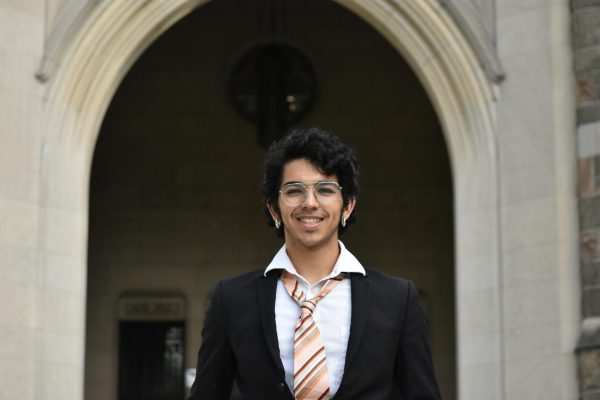Senior Researches Music’s Emotional Effect on Listeners

Senior Sarah Cassidy, FCRH ’21, hopes her research into the emotional effects of music can help further social justice. (Courtesy of Sarah Cassidy)
Is a song’s melody the only factor in your emotional response to music? Sarah Cassidy, FCRH ’21, has been researching and collecting data to find an answer to this question. As a musician herself, Cassidy said she has always been able to recognize the kind of power that music holds over our emotions.
“Just listening or playing a song on guitar has the power to completely influence my emotions,” said Cassidy. “I personally think this is such a cool concept.”
In order to grasp the effects that music has on those who listen to it, Cassidy chose to focus on the specific aspects of musical form that create emotional influences. To explore music beyond just its melodic structure, Cassidy also studied the tempo and dynamics of music as they pertain to the greater emotional impact.
Once she figured out her exact topic, Cassidy jumped right into the research portion of her project before collecting firsthand data. However, she ran into a small hiccup.
“I realized that musically-induced emotions are a fairly new concept that was lacking in research,” Cassidy said.
Due to the lack of currently available research on musically-induced emotions, there was only one available scale of which to measure these emotions. This scale, known as the Geneva Emotional Music Scale, or GEMS, groups states of emotion into nine different categories. These categories are then further divided into nine smaller subfactors.
Cassidy had to request permission from the Institutional Review Board, known as the IRB, to use this scale. The IRB is a group regulated by the FDA to review and monitor research that involves human subjects. Ultimately, the group is responsible for protecting the rights and welfare of human subjects.
Cassidy found herself going through multiple processes to gain approval from the IRB. The first of these was a simple expedited review form detailing her research and the processes involved. Cassidy also created a demographics survey and a consent form to ensure that her human subjects were taken care of.
The human subjects were the most important part of her research, Cassidy said. The original research plan was to meet with subjects in person and play them different versions of a piano composition. Here, Cassidy would measure their emotional response. Cassidy had to find a way to adapt when COVID-19 suspended all in-person research. Instead of meeting in person, Cassidy designed a new method involving virtual meetings through Zoom. The researcher and her participants were able to conduct the research study online.
Currently, Cassidy’s research is incomplete and is still in the data collection stage.
“I believe that research is critical in continuing to understand and aid communities, vulnerable populations and individuals,” Cassidy said.
She said she hopes to use her current research experience to help guide her research in social justice issues as she enters graduate school.

Sebastian Diaz is a senior from Chapel Hill, N. C. who is double majoring in journalism and film. After starting as a news reporter for The Fordham Ram...














































































































































































































